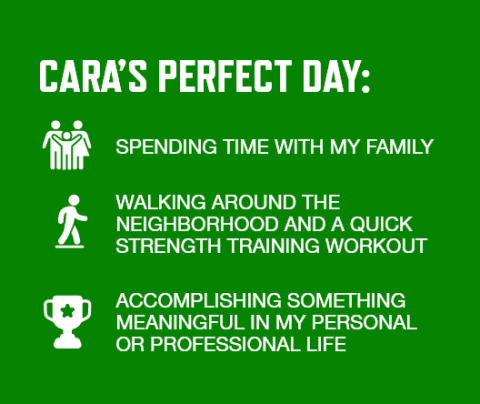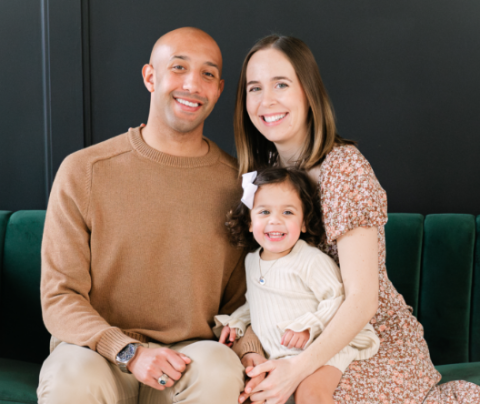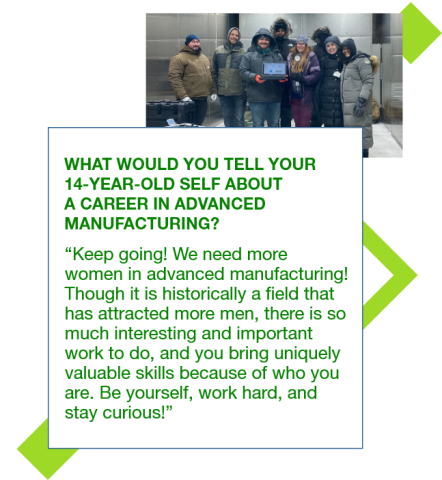
Robotics Leader, Curious Learner, Exercise Enthusiast
Cara Cranston’s journey to becoming the Director of Technology Programs at the ARM Institute is grounded in deep technical expertise, strategic vision, and a passion for collaborative problem-solving. With over 13 years of experience that spans the defense, manufacturing, and technology sectors, she’s played a central role in advancing robotics for American manufacturing.
Since joining the ARM Institute in 2018, Cara has led from the front—first as a Project Manager, then Senior Program Manager, and now as Director. She’s overseen more than 120 robotics-focused development projects, guiding a team of Program Managers while working closely with hundreds of collaborators. Her work ensures that these projects not only meet the needs of the government but also deliver a tangible impact to manufacturers nationwide. She brings together members of the Institute’s 450+ organization consortium to tackle shared challenges through workshops and collaborative meetings, accelerating innovation and adoption across the robotics and AI industries.
Before the ARM Institute, Cara managed cybersecurity programs for aircraft carriers at the Navy, where she safeguarded complex industrial control systems against digital threats. This high-stakes experience sharpened her ability to lead cross-disciplinary teams and develop resilient systems.
With a Bachelor of Science in Mechanical Engineering from Villanova University and a Certificate in Cybersecurity from the Naval Postgraduate School, Cara is a powerful example of how each of us can reshape the future of advanced manufacturing. She regularly mentors others, shares her career story, and champions women’s voices within the field, showing what’s possible when curiosity meets opportunity. Cara Cranston is a Modern Maker.
Q&A with Cara
How did you find your way to working in advanced manufacturing?
My path to advanced manufacturing came from technical curiosity and a desire to do mission-driven work. As a student, I was drawn towards math and science and enjoyed learning how things worked. My mom encouraged me to apply for an engineering camp hosted by the Society of American Military Engineers (SAME), and that experience ignited a passion in me that I’ve been chasing for the last 18 years. The camp was hosted in Vicksburg, MS in the years following Hurricane Katrina, so I saw firsthand the impact that engineered systems had on everyday life.
I pursued a degree in Mechanical Engineering at Villanova University and learned more about the human impact of engineering work. I had the opportunity to design and install water systems for rural Nicaragua with my professors and peers through Water for Waslala. That experience solidified my desire to use my degree in some form of service to my community, which led me to employment with the US Navy’s civilian engineering command, NAVSEA, as an engineer and program manager.
At NAVSEA, I worked with exceptionally dedicated civil servants to modernize the hull, mechanical, and electrical systems on naval surface ships and aircraft carriers. Over time, my role grew into program management and new technology development, which prepared me to join the Manufacturing USA network as a program manager with the ARM Institute.
I was drawn to the mission of the ARM Institute, which perfectly combined my passions for technology and service. In the seven years I’ve been with the ARM Institute, I’ve had the pleasure to work with hundreds of organizations and project teams to advance American manufacturing through robotics and automation. It has been a privilege to use my skills and experience to further such an important cause.


What is the most challenging part of your job?
The most challenging part of my job is prioritizing the time and efforts for myself and my team. There are always more important things to work on than we have the capacity for, so we need to be very intentional about our bandwidth and priorities. Having a clear alignment to our strategy and amazing colleagues that I respect and enjoy working with are essential keys to overcoming this daily challenge.
What is the best part of your job?
The best part of my job is being at the center of a consortium of brilliant innovators. In my years with the ARM Institute, I’ve worked closely with so many of our members and learned something new and important from each of them. The opportunity to go deep on so many different projects and technologies appeals to my curious disposition and keeps me excited about the work each day. I love getting to know our members and in turn become a better resource for the rest of the consortium.
What would people be surprised to learn about manufacturing or your role in manufacturing?
I think people would be surprised to learn how much variety there can be in a manufacturing career. No two days are the same for me! Having followed a career path through engineering, to program management, and now technology leadership, there has always been a huge range of interesting and meaningful work to jump into. I've found the best way to get the most out of this exciting field is to say "yes" to new opportunities and be eager to learn new skills along the way.
What advice do you have for someone new to the industry or considering manufacturing as a career?
My advice for people who are new to the industry would be to see every person you work with as an opportunity to learn and grow. Manufacturing brings together people of so many backgrounds and varied expertise, each one with a different perspective and something to offer your growth and career development.
What makes you excited to go to work on Mondays?
I’m excited to go to work on Mondays because I know what I’m doing is important. Accelerating the adoption of robotics and AI into American manufacturing will create jobs, secure our supply chain, and strengthen our economy. Having a small part to play in that mission makes it so easy to be excited about my job!
What are the three most important skills for your job?
The most important skills for my job are emotional intelligence, technical curiosity, and the ability to synthesize across many projects, people, and organizations. Working in a dynamic consortium environment like the ARM Institute requires a high level of engagement and a willingness to continually learn new things.
If you didn’t have to work, how would you spend your day?
If I didn't have to work, I would spend more of my time caring for my family and volunteering. As many working parents know, there is never enough time to do it all! In all seriousness, I love to cook, exercise, and read fiction. My favorite recipe inspiration comes from Caroline Chambers. I work out at home following apps like Sweat and Peloton, and some books I've read recently and loved are The Covenant of Water and Pachinko.
What activity gives you the most energy?

I feel most energized after a walk around my neighborhood. Getting fresh air, listening to good music, and raising my heart rate (Pittsburgh hills) is usually exactly what I need to clear my head and begin a new task with clarity.
What hobbies make you better at your career?
I've always been a voracious reader, and though I wouldn't exactly consider that hobby professional development, I gain a lot of value from diving into perspectives that are so different from my own. Over the years, great stories have allowed me to understand more about people in general, which has given me more insight into the wide range of experiences that my colleagues and collaborators bring to the table.
How does the work you do impact the world?
Advancing robotics and AI technologies for manufacturing will have a marked impact on American competitiveness. The development and innovation that I have helped bring about will create jobs and revive the domestic manufacturing industry. We can and will make more in the USA, with the adoption of advanced technologies like robotics and AI.




